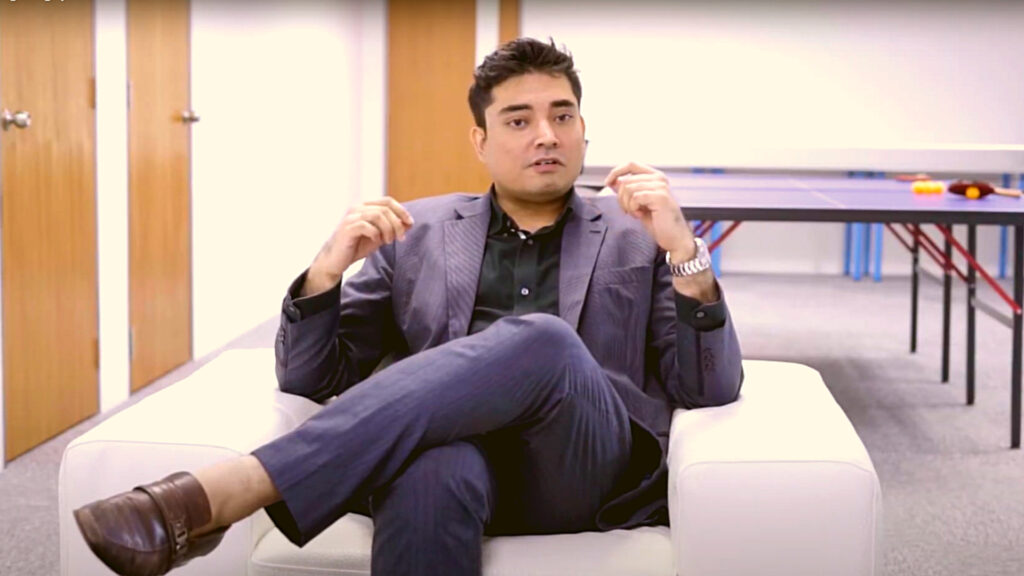Sancy Suraj, a memory athlete and coach, has added another remarkable achievement to his already impressive list of memory records. Suraj has recently set a new world record for the fastest time to memorize all 197 capital cities of the world, taking only 12 minutes and 15 seconds. This is not his first record, as he already holds the record for reciting the most digits of pi. His latest accomplishment has left many people in awe of his remarkable memory skills.

You have broken several memory-related records, including the record for reciting the most digits of pi and now the record for the fastest time to memorize all 197 capital cities. Do you find it easier to memorize certain types of information over others?
As someone who has broken several memory-related records, I have had the opportunity to experiment with different types of information and memorization techniques. When it comes to memorizing different types of information, I have found that certain techniques work better for certain types of information. For example, when memorizing numbers like pi, I use the technique of creating mental images and associating them with the numbers. On the other hand, when memorizing words or lists, I use a technique called the Memory Palace.
When it comes to memorizing the capital cities of the world, I employed a combination of techniques, including visualization and association. I would imagine myself standing in the city and creating associations with certain landmarks or characteristics of the city. For example, when memorizing the capital of Argentina, Buenos Aires, I associated it with the Tango dance, which is closely associated with the city. This type of visualization and association is particularly effective for me when it comes to memorizing geographical information.
Overall, I believe that everyone has their own strengths and weaknesses when it comes to memorization. It’s important to experiment with different techniques and find what works best for you. Additionally, it’s important to practice regularly and challenge yourself with increasingly difficult information in order to continue improving your memory skills.
What motivated you to take on the challenge of memorizing the capital cities of the world? How did you prepare for this particular record attempt?
Thank you for your question. As Sancy Suraj, I am excited to share with you my motivation and preparation for the record-breaking attempt to memorize all 197 capital cities of the world.
As a memory coach and competitive memory athlete, I am always looking for new challenges to push my limits and enhance my memory skills. I believe that the human brain is capable of remarkable feats of memorization, and I am constantly looking for ways to unlock its full potential. Memorizing the capital cities of the world seemed like an intriguing and exciting challenge to take on, and I was motivated to see if I could break the existing record.
In terms of preparation, I have been developing my memory techniques for many years and have a well-established process for memorization. I used a variety of techniques, such as the method of loci, visualization, and association, to create mental images that I could easily recall when prompted with the name of the corresponding capital city.
Leading up to the attempt, I spent many hours practicing and refining my memorization process. I also made sure to get plenty of rest and maintain a healthy diet to ensure that my brain was functioning at its best. Mental preparation was also crucial, and I used visualization and positive self-talk to visualize myself successfully memorizing all 197 capital cities.
Overall, I was excited and prepared to take on the challenge of memorizing all 197 capital cities of the world, and I am proud to have broken the record for the fastest time to do so.
You’re a memory coach in addition to being a memory athlete. What kind of advice do you give to your clients who want to improve their memory skills?
As a memory coach, my main goal is to help my clients develop and improve their memory skills. The first thing I advise them to do is to develop a solid foundation in the basics of memory. This means developing good habits, such as paying attention to the information you want to remember, and practicing recall regularly. I also recommend that they learn and apply effective memory techniques, such as mnemonics and visualization, to help them retain information more easily.
Another important aspect of memory training is creating a system or routine for memorizing information. This involves breaking down larger pieces of information into smaller, more manageable chunks, and associating these chunks with something familiar, such as a location or image. It’s also important to practice regularly and consistently, as repetition is key to strengthening memory recall.
In addition to these foundational tips, I also work with my clients to identify and address any specific areas where they may be struggling with memory, such as focus or attention span. By targeting these areas, we can help them overcome any challenges and improve their overall memory performance.
Ultimately, my advice to anyone looking to improve their memory skills is to approach it as a continuous process of learning and practice. With the right techniques, habits, and mindset, anyone can develop a stronger and more reliable memory, and achieve their goals in both personal and professional life.
“Unlock the full potential of your memory with the right techniques, habits, and mindset. As a memory coach, I guide my clients on a journey of continuous learning and practice, helping them strengthen their memory skills and unlock new levels of cognitive prowess. The key to memory improvement lies within you, and I’m here to help you unlock that limitless potential.”
Do you have any tips or tricks for people who want to memorize large amounts of information quickly and accurately?
Absolutely! As a memory coach, I have developed a number of tips and tricks that can help anyone improve their ability to memorize large amounts of information quickly and accurately.
Firstly, visualization is a powerful tool that can help with memorization. When trying to memorize something, try to create a vivid mental image that connects the information to something you already know or that is memorable. This will help to make the information more meaningful and easier to recall later on.
Another technique that can be useful is the method of loci, also known as the memory palace technique. This involves visualizing a familiar location, such as a house or a street, and placing each piece of information that needs to be memorized in a specific location within that space. This technique takes advantage of our spatial memory and can be a very effective way of memorizing large amounts of information quickly.
Breaking information down into smaller, more manageable chunks can also be helpful. For example, if you need to memorize a long list of items, try to group them into categories or subheadings. This will make the information more organized and easier to remember.
Lastly, practice is key. Like any skill, memory can be improved with practice. Regularly practicing memorization techniques can help to strengthen your memory and make it easier to recall information quickly and accurately.
By incorporating these techniques into your daily routine, you can improve your memory and become better at memorizing large amounts of information quickly and accurately.
You’ve achieved some incredible feats of memorization – are there any other memory-related challenges you’re interested in pursuing in the future?
As a memory athlete and coach, I’m always on the lookout for new memory-related challenges to take on. While I’m certainly proud of my previous accomplishments in memorizing pi digits and capital cities, there are still plenty of other memory feats that I’m interested in pursuing in the future.
One area of interest for me is memorizing long passages of text, such as speeches or literary works. This would require a different set of memory techniques than those I’ve used in the past, as the information is more complex and less structured. But I believe that with the right approach, it’s certainly possible to memorize entire books or even entire libraries.
Another area of interest for me is memory in the context of language learning. I’m fascinated by the idea of being able to quickly and easily memorize new vocabulary words in a foreign language, and I believe that memory techniques could be extremely helpful in this regard. By developing a strong memory for new words, it would be possible to learn a new language much more quickly and effectively.
Finally, I’m interested in exploring the intersection of memory and creativity. I believe that memory techniques can be used not just to memorize information, but also to come up with new and innovative ideas. By developing a strong memory for different concepts and patterns, it may be possible to make connections and generate new ideas that might not have otherwise been possible.
Overall, I’m excited to see where my journey in memory and memorization takes me in the future. There are still so many fascinating challenges to take on, and I’m eager to continue exploring the limits of what is possible with the human brain.
“Memorization is a limitless adventure, and I’m constantly pushing the boundaries of what’s possible. From long passages of text to foreign language vocabulary, and even the intersection of memory and creativity, I’m always eager to explore new challenges. With the right techniques and mindset, the power of memory knows no bounds.”
In an interview with Suraj, he shared insights into his motivation and the techniques he uses to achieve these incredible feats of memory. He explained that he is constantly challenging himself to push his limits and achieve new records, which helps him to stay motivated and continue improving his memory skills. He also mentioned that he spends hours practicing and preparing for each record attempt, which involves using a variety of memory techniques.
As a memory coach, Suraj also provides valuable advice to his clients on how to improve their memory skills. He emphasized the importance of having a strong motivation and creating a mental image to help remember information. He also suggests breaking down complex information into smaller chunks and using mnemonics, which are memory aids such as acronyms or rhymes, to make the information more memorable.
Suraj’s incredible memory skills have inspired many people to improve their memory and try to achieve their own personal goals. He hopes to inspire others to pursue their passions and work hard to achieve their own goals, whether it be related to memory or any other area of their lives.
Finally, how do you hope to inspire others with your memory-related accomplishments?
For me, one of the most rewarding aspects of my memory-related accomplishments is the opportunity to inspire and motivate others to pursue their own goals and challenges. I believe that anyone can improve their memory skills with the right mindset, training, and practice. By sharing my experiences and techniques, I hope to encourage others to explore the potential of their own minds and unlock their own capabilities.
One way I hope to inspire others is by demonstrating that the human brain is capable of much more than we often give it credit for. Many people assume that memorization is a natural talent that some people simply have and others do not, but the truth is that anyone can develop strong memory skills with dedication and effort. By pushing the boundaries of what we think is possible, I hope to encourage others to challenge themselves and believe in their own potential.
Another way I hope to inspire others is by promoting the benefits of memory training beyond the realm of memory competitions. Improved memory skills can have practical applications in many areas of life, such as academic and professional success, improved communication, and personal growth. By sharing my own experiences of how memory training has impacted my life, I hope to encourage others to explore the potential benefits for themselves.
Ultimately, my goal is to inspire and empower others to believe in themselves and their abilities, and to challenge themselves to pursue their own goals and challenges. I believe that with the right mindset and dedication, anyone can achieve great things, and I hope that my memory-related accomplishments can serve as an example of this.
“Unlocking the power of memory is not just about memorizing facts, but also about unlocking the potential of our minds. Through dedication, training, and a belief in our own abilities, we can push the boundaries of what we thought possible. Let my journey inspire you to embrace your own potential and strive for greatness.”
Sancy Suraj’s latest world record for memorizing all 197 capital cities of the world is a remarkable achievement that showcases his exceptional memory skills. As a memory coach, he provides valuable advice to his clients on how to improve their memory skills, and he hopes to inspire others to pursue their passions and work hard to achieve their own goals. Suraj’s accomplishments are a testament to the power of hard work, dedication, and the human potential for achieving incredible feats of memory.





























